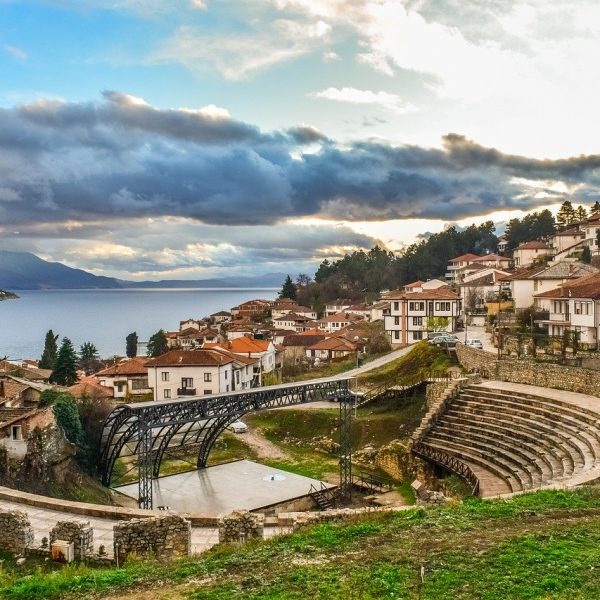Bistra Kumbaroska, photography by Matej Kolakovic
Interview by Stefan Alievikj
Youth activism, social innovation and poetry are her three main passions! Challenge:Future , Mladi Info and AIESEC are the three crucial organizations that enabled her to take part in creating new perspectives and possibilities for young people all over the world. Based in Slovenia, at the moment she is part of the team that develops the Mladi Info Network and the Mladi Info Slovenia branch, and at the same time, together with more than 35,000 young members of the Challenge:Future community, she is taking participation in the establishment and nurture of a solid platform for youth innovations, positive impact and growth. Yet, let us hear something more from Bistra Kumbaroska herself!
1. What are your current engagements with MladiInfo as you are part of the team?
Bistra: Mladi Info has always been one of my most adored and respected Macedonian brands. I know Mladi Info from the very start because it was a webpage that made my dreams come true. As a young student, I was always looking for new opportunities and reasons to travel abroad and I always wondered how can my Norwegian or Japanese friends find so many open calls for themselves, whilst I had to find connections in certain ministries or offices in order to obtain any opportunity. Mladi Info came at a time when Macedonia had low or no flow of information. Soon it developed into a regional hub of information, today being not only a European info portal but also a network of organisations around several countries in EU. I am happy to be part of the team who spread and watched Mladi Info grow. Working with people like Antoaneta is always a privilege. In Mladi Info Slovenia branch, three ladies from 3 different countries make marvelous steps and projects for youth development. Petra, Jasminka and Marta, together with colleagues from Slovakia, Czech Republic, Montenegro, Macedonia and Croatia now pave the road of development for many young people. Winning the Special European Youth Award for Business Potential in 2012 was a huge reward and recognition of all those efforts. I am wowed by the impact and I am happy to be part of this family of growth.
Bistra at the European Youth Award Summit in Graz as Mladiinfo representative
2. You are also a young and vibrant poetess! What inspires you to write poetry and who are your favourite poets?
Bistra: Writing poetry for me is not necessarily an act of writing. It can be an act of living, too. The deepest inspiration comes from simple things, things that make you wake me up in the morning without pressing the snooze button. I write in order to materialize my love of life, to put it into something understandable and readable, to share it, to have it, to build upon it. Poetry is not only written in words, but also in deeds and actions. In my opinion, anyone who lives a deliberate life is a poet of a kind. However, I could never imagine saying this without the discoveries and knowledge shared by my father, Razme Kumbaroski. He, being a poet, writer, essayist and critic himself, planted the seeds of art in my life. Of course, every age had its different waves of influence. But if I have to select, I would definitely mention Richard Brautigan, Desanka Maksimovic, Kenneth White, Yehuda Amichai, Natasa Buntevska and Nikola Madzirov.
3. What was your first poem about?
Bistra: Friendship and love, it was about human connections. I was 10 and I already admired how people connect and how many special things they can give to each other. This question reminded me of one saying: You spend your whole life rewriting the first poem you ever wrote. Might be true!
4. You are also part of the Slovenian based Think-Do-Tank Challenge:Future (C:F) core team. How did you found out about C:F and how did you become part of the team?
Bistra: www.challengefuture.org was a web site I used to visit from time to time while living in Macedonia. I never knew it was based in Slovenia, or Europe. At that time, I was working in Dukat Macedonia, as Junior Brand Manager, collaborating and learning from an exquisite team of people. Soon, I was awarded with a postgraduate scholarship to study International Business at Faculty of Economics, Ljubljana. Four months after moving to Ljubljana, I came to know about a company called Third Millenium Knowledge (I thought to myself: wow, what a name!) and realized it was the founding company of the global youth project Challenge:Future (I thought to myself: how cool is that!) Soon, I got the chance to meet the core team, Andreja Kodrin and Olga Veligurska, and became part of an international demanding environment where obligations ranged from online communication to doing business reports. That wide range of activities allowed me to develop and test myself in different situations. Even from the start, I enjoyed a lot of things: from drinking morning tea, to gathering and processing data from the internet. However, most of all, I enjoy the team, the people that I meet every day, the dynamics of the communication and the flow of positive energy in the office.
Bistra and part of C:F core team at Singapore local event
5. How art and work get connected in your daily life?
Bistra: For many years, I felt somehow distracted by the duality of my fields of interest. Raised by a father poet and a mother financial manager, I was struggling for some time to choose between these two. Until I realized that combinations and variations are the beauty of life. Business and art can go together if you know how to combine them. I am still learning that, but at the moment, working in a super creative environment, really makes it easy for me.
6. Just recently, you took participation in a transnational Youth in Action project called “Create Future with Creating Jobs”, as part of C:F team. You traveled to faraway countries such as Singapore, Uganda and Rwanda. How was it to experience bits of Asia and Africa?
Bistra: In Singapore, I took part in one of the most exciting youth empowerment programs organized by Ground-Up Initiative and Challenge:Future, in a totally vibrant and positive Kampung spirit of Singapore! It was a unique, high level program that gathered 30 polytechnic and ITE students from 6 different institutions in order to fight youth unemployment with business and social innovations. To see more of the EXCITE program, please check the video. The programme started on 1st June, and ended on 21st, with an “Facing the World” event where all event participants, organized in 8 groups, pitched their ideas in front of an international jury. International and local speakers, including Andreja and me, shared personal and other success stories with an audience of more than 150 people. The winning team received start-up award from DBS Bank Singapore. It was amazing to meet so active and positive young people, interested in creating their own businesses, projects or simply life stories. Then, I understood why Singapore has one of the lowest youth unemployment rates on global level.
Furthermore, as much as I admire short straight-to-the point pieces, for me it would be extremely difficult to put Africa and the whole experience in one paragraph! Everything I saw and heard, everyone I met and shaked hands with, every road we took and every piece of eyes I encountered is worth to be mentioned and shared. What stroke me the most was the fact that people with no regular electricity access (young people, just like us) managed to produce wine made of pineapples, or ecological liquid soup, or green leaf tea with lemon flavour – all kinds of innovative products delivered to the point of sales by bikes, or foot, all of that done in a warm community spirit, enabling the employment of more than 15 young people per business. I couldn’t believe my eyes how far manual production could go, but also, how different humanity can develop.
Bistra with Kyanamira Youth Group Uganda
Regarding the C:F events hosted in Rwanda and Uganda, in partnership with BCET Rwanda and Let Us Save Uganda, they gathered more than 200 young people from 4 different districts/regions. We also visited more than 15 youth businesses and organisation with real impact and grass-root projects and held almost 20 motivational speeches and presentations on local and regional level.
Thinking about how much discussions, conferences and funds in the advanced world are poured into the topic of sustainability or women rights, I would only like to point out that Rwanda does not permit any usage or production of plastic bags and it is the only country in the world with 51,9% of female MPs in the Parliament. We have a lot to learn from Africa!
7. Finally, as a true youth change-maker from Macedonia, what would be your message to emerging active youth?
Giving general messages to youth is really not something I enjoy. Youth nowadays is facing a lot of challenges and pressures. All latest relevant reports name our Y generation as “the lost generation” or “generation at risk”. We live in times of “follow your dreams” and “you do not have the needed skills”. Reading the latest ILO report on global youth employability trends, I felt sad to read how high the percentage of inactive youth in Europe is (unlike Asia and Africa). I agree that every young individual in this world is facing different challenges and living in different realities. Furthermore, we all react to the circumstances in different manners. Out of all those stories and experiences, let’s try to build virtual spaces of sharing and impact, because in that way we would learn a lot from each other and we would change each other. As I have mentioned in one of my CF articles: in all our struggles, it is important to know the answer to 4 questions:
1. What I love doing?
2. What are you good at, really?
3. What the world needs?
4. What the world will pay for?
Stay awake!






